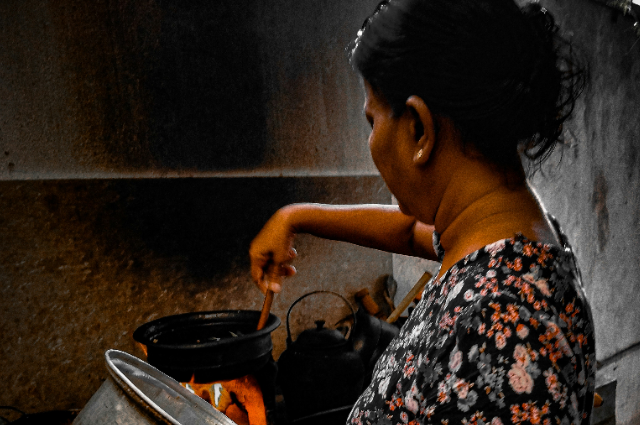
Photo by Raveesha Nethmina on Unsplash
We love to call her a superwoman, but let’s get real - is that a celebration or a life sentence in disguise?
In every home, in every society, the same unspoken tale goes on: Mum never has time to rest. Not because she doesn't deserve it, but because she doesn't get it. The second she sits down, someone rings. The moment she completes one thing, another arrives. She does not merely tote bags, she totes expectations—from her kids, her spouse, her in-laws, her community, and society at large. While the world applauds the multitasking "wonder woman," it conveniently overlooks the burnout, the mental load, the emotional labour that never gets clocked in or out. This isn't empowerment—it's exploitation masquerading as appreciation. And it's time we call out the idolization of the grind and wonder why Mum's got to do it all, always.
At the center of the so-called "superwoman" myth is a never-ending cycle of unpaid, undervalued, and invisible work, most of it done in the home. Domestic work, however much it may be devalued as "simple tasks," is the backbone of family survival—cleaning, cooking, laundry, budgeting, scheduling, and childcare are not hobbies; they are full-scale operations. And yet, they are seldom considered actual work. These tasks disproportionately fall on mothers, somehow supposed to get them done with a smile and never stop. Take the typical weekday of a working mom: rising with the dawn to make breakfast, making lunches, readying school children, coping with school runs, traveling to work, carrying out her working life, returning home only to plunge into supper preparation, homework assistance, getting the kids ready for bed, and running the household. Where is the "rest" in this rotation?
Furthermore, keeping children's lives in check nowadays has become an exhausting bureaucratic job—booking extra-curricular activities, monitoring schooling, scheduling appointments, negotiating emotional support, and frequently acting as the unofficial contact person for schools and social duties. Such a mental load—is referred to by sociologist Arlie Hochschild as the "second shift"—serves as a jarring reminder that despite the workday itself being completed, countless mothers will experience a whole night of unpaid work that is not valued but demanded.
Films tend to provide us with soft versions of this day-by-day emotional grit. English Vinglish is a case in point, where Shashi, a dedicated homemaker, is ridiculed for not being good in English, but remains the unremarked emotional centre of her family. Undervalued as she is, she keeps everyone's needs in order with love and inner strength. The film might reach its climax on a note of poetic justice, but it starts with its roots in a very hard truth: the world takes for granted women's emotional work, until they quit. Mrs. doesn’t just tell a personal story—it acts as a cultural reckoning, asking what happens when the “emotional centre” of the home stops absorbing everyone else’s chaos.
The irony cuts even deeper when one thinks about how society romanticizes the working mother but provides little structural backing—puny maternity leave, limited childcare, and a merciless corporate culture. One glaring case in point is during the COVID-19 pandemic, when millions of women were compelled to step out of the labor force, not because they were lacking in skill or desire, but because the unpaid work at home proved too much in the face of closed schools and daycare. It wasn't institutions or fathers who filled in the gaps. It was my mother's. Again. Quietly. In reality, the balancing act required of mothers is not a skill, but a survival. And yet, this Herculean work is not revolutionised but romanticised. We celebrate the juggling act, but we never ask why she's the one with all the pins.
This unpaid emotional labor is endless as well as invisible. A mother recalls that her son prefers his sandwiches without crusts and that her daughter requires added reassurance when there are exams. She can hear tension in a partner's tone and modulates her own to de-escalate. She keeps the peace in the family, frequently taking in conflict so others need not. This endless paying attention and feeling, though emotionally draining, are demanded of her, not rewarded. In contrast to physical drudgery, emotional labor has no dirty laundry or dishes to show for it—only the weary eyes of a woman who has kept too many together for too long.
So let us rip away the cape. Let us cease applauding for the "superwoman" and begin to refer to it as what it actually is: a cultural justification to overburden mothers and refer to it as strength. Her labor—hidden and visible, physical and emotional—isn't admirable because she volunteered. It's admirable because she makes it through. But making it through shouldn't be the metric. We need to remind ourselves: when did we start believing that a mother's tiredness was okay, her self-sacrifice something to be expected, and her silence something to be admired? "Mum's work is never done" because she is not infinite, but because we have restricted her choices. Until emotional labour is respected, caregiving is divided, and domestic work is seen as something real and respectable, the superwoman myth is not a compliment—it's a trap. It's time we ceased looking up to her for doing it all and began helping her share the burden.
